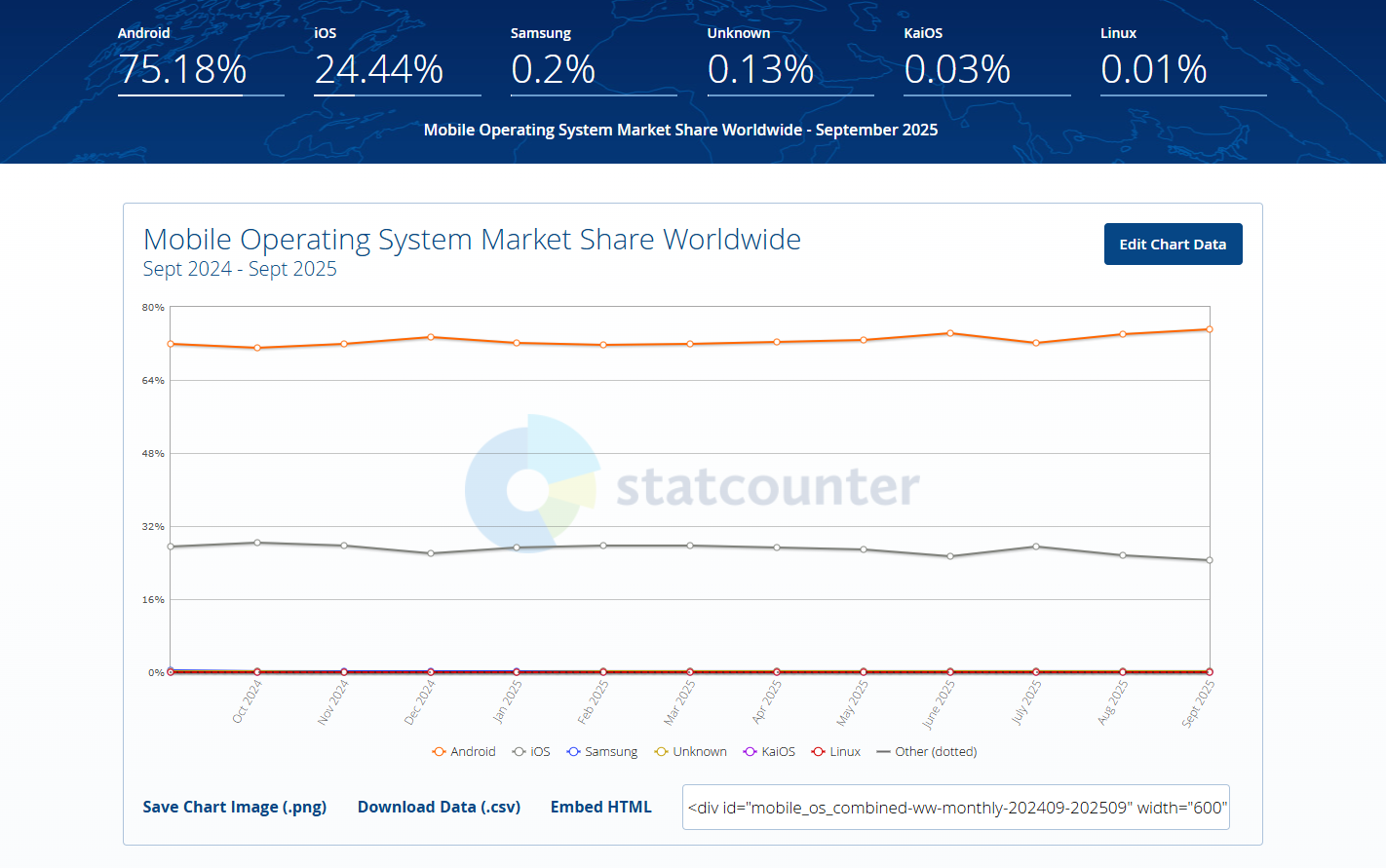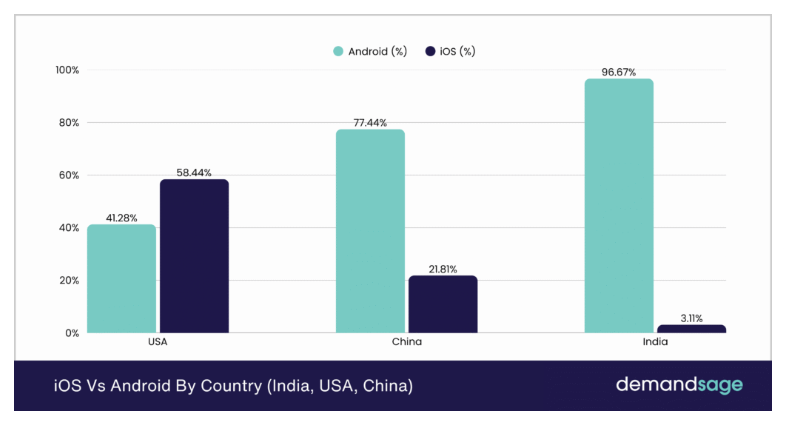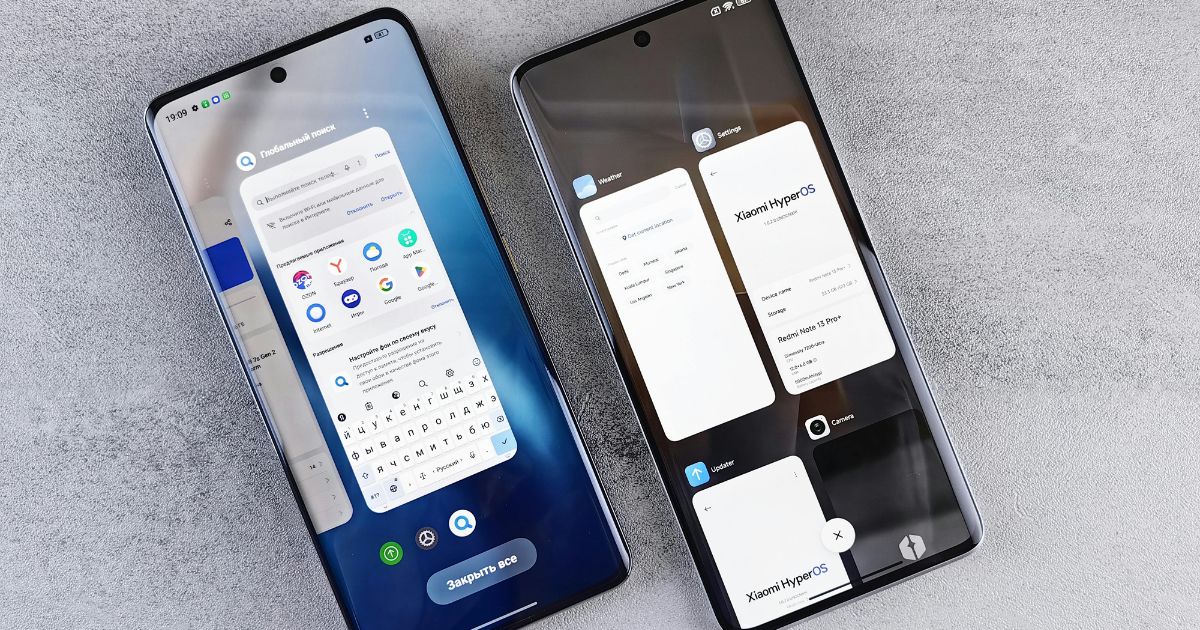Every business that invests in a mobile app faces a critical decision: should you launch on iOS or Android first?
This choice can determine how quickly your app reaches users, how much revenue it generates, and how effectively it supports your growth strategy.
With billions of active devices worldwide, understanding the differences between these platforms goes far beyond market share. From user behavior and spending habits to development speed and approval processes, each platform has unique strengths and challenges.
Making the right choice from the start can save time, reduce costs, and position your app for success, while a misstep can slow growth and limit revenue potential.
Reasons for Native App Development
Native app development refers to the process of building a mobile application specifically for one operating system using its dedicated programming languages and tools. For iOS, developers typically use Swift or Objective-C within Apple’s Xcode environment, while Android apps are built with Kotlin or Java using Android Studio.
Because native apps are designed for a single platform, they can fully leverage the device’s hardware and operating system features, offering users a seamless and high-performance experience.
Why Businesses Choose Native App Development
- Superior Performance: Native apps run faster and more efficiently because they are optimized for a specific platform. They communicate directly with the device’s core resources, such as the CPU and memory, which leads to smoother animations, quicker load times, and an overall better user experience.
- Enhanced User Experience (UX): Native development allows for the use of platform-specific UI components and design guidelines. This ensures that the app feels familiar to users, aligning with their expectations for navigation, layout, and interactions. A polished and intuitive UX often translates into higher user satisfaction and retention.
- Better Security and Reliability: Since native apps use official SDKs and development tools, they benefit from the platform’s built-in security measures and regular updates. This helps safeguard sensitive user data and makes the app less vulnerable to common security threats.
- Access to Device Features: Native apps can easily access the full range of device capabilities, such as the camera, GPS, push notifications, and biometric authentication. This enables developers to create more sophisticated and feature-rich applications that can fully integrate with the device’s hardware.
- Offline Functionality: Because native apps can store data directly on the device, they often provide better offline access and functionality. This is especially valuable for users in areas with limited or unstable Internet connections.
Choosing native development is often the right move for businesses that prioritize performance, user experience, and scalability. However, one of the most strategic decisions within native app development is determining on which platform to build first.
Next, we will explore the key factors to consider when deciding between iOS and Android as your starting point.
User Demographics in 2025
Before we dive into specific numbers, let us be clear about why user demographics matter. Understanding who uses each platform helps you decide not just which platform to build first, but how to tailor your app, monetize it, market it, and grow it effectively.
If you build for a platform that does not align with your target audience’s preferences and behavior, you risk misallocating development resources and missing revenue opportunities.
Below are several key user-demographic distinctions between iOS and Android.
1. Global Market Share/Reach
Android continues to dominate global smartphone shipments and installations. As of late 2025, Android holds roughly 75.18% of the global mobile OS market share, while iOS is at about 24.44%.
In some earlier reports the split was approximated at 72% vs 28%, but the more recent StatCounter data suggests Android is closer to 75%.
This makes Android the obvious choice when your goal is maximum geographic breadth and total users.

(Source: StatCounter, GlobalStats)
2. Regional Dominance in the US
In the US, iOS outpaces Android. In 2025, iOS commands approximately 58.44% of US smartphone users, while Android holds 41.28%.
That means for a US-centric or premium-market app, iOS gives you more reach within that high-value region.

(Source: Demand Sage)
3. Spending/Monetization Behavior
A critical metric is who spends more. In 2025 forecasts, iOS users will account for about 68.6% of all consumer spending on mobile apps, with Android capturing 31.4%.
Because iOS users are more willing to pay for premium apps, subscriptions, and in-app purchases, iOS is often the better first choice for revenue-driven apps.

(Source: Backlinko)
4. Device and Socio-Economic Profiles
iOS devices tend to skew toward higher income brackets, urban areas, and markets with stronger purchasing power. Android has broad penetration in emerging markets and in many price-sensitive segments.
That means if your app targets users with higher disposable income or in developed markets, iOS may align better; however, for mass adoption, Android is a strong choice.
5. User Loyalty and Ecosystem Lock-In
iOS users often stay within the Apple ecosystem (iPhone, iPad, Mac). Switching between platforms can be more expensive and disruptive. Android users may switch between brands or versions more readily.
A loyal iOS user base can help with retention, cross-device engagement, and longer lifetime value.
Given these demographic contrasts, here’s two guiding principles:
- Choose Android first if your goal is broad, international reach, especially in emerging markets or global scale.
- Choose iOS first if your priority is revenue, premium users, and markets with strong spending habits.
App Monetization Strategies
Monetization on iOS and Android diverges largely because user expectations, platform rules, and historical precedents differ across ecosystems. What works on one platform may underperform on the other. Developers need to match their monetization model to both the technical constraints and behavioral norms of each platform.
In 2024, global in-app purchase (IAP), subscription, and paid app revenue across iOS and Google Play reached $150 billion, marking a 13% year-on-year increase. iOS consistently accounts for the greater share of that total, reflecting stronger consumer willingness to pay within its ecosystem. As a result, many iOS apps lean more heavily on premium models such as paid downloads, subscription tiers, or direct in-app purchases as their primary revenue source.
In contrast, Android’s larger install base and more flexible environment make ad monetization a more viable anchor. Many Android developers (especially in regions or app categories with lower average spend) adopt ad formats such as interstitials, native ads, rewarded video, or hybrid freemium models combining ads with optional in-app purchases. Industry reports from data.ai highlight this trend, showing that ad-supported monetization remains a key driver of Android revenue.
User spending habits also differ notably between platforms. Research summarized by Exploding Topics indicates that the average iPhone user spends around $12.77 per app, compared to $6.19 for the average Android user. This gap reinforces why iOS apps often succeed with higher-value purchases, while Android apps thrive on reach and ad impressions.
In practice:
- On iOS, developers tend to prioritize subscription models, premium upgrades, or higher-value in-app purchase tiers, as users show a greater willingness to pay for quality and convenience.
- On Android, many apps adopt freemium models where a free, ad-supported core experience is upgraded via in-app purchases. The lower average spend encourages monetization through scale and advertising.
Ultimately, effective app monetization requires aligning your strategy with the behaviors and expectations of your users on each platform. The right model depends on your audience, your app’s value proposition, and whether your business goals favor user scale or per-user revenue.
User Adoption Rates
User adoption rates refer to the percentage of active devices running a specific version of an operating system. This metric is crucial for developers and businesses as it indicates how quickly and widely a new OS version is being adopted by users.
High adoption rates suggest that users are promptly updating their devices, which can be beneficial for developers aiming to leverage the latest features and security enhancements. Conversely, low adoption rates may necessitate supporting multiple OS versions, potentially increasing development complexity and costs.
iOS vs Android: Adoption Rates in 2025
- iOS 18 Adoption: As of August 2025, iOS 18 has achieved an adoption rate of 87% across all compatible iPhones. This rapid adoption is attributed to Apple's streamlined update process and the availability of updates directly through device settings.
- Android 15 Adoption: In contrast, Android 15 has an adoption rate of 24.6% as of October 2025. This slower adoption is influenced by factors such as device fragmentation, carrier-controlled updates, and manufacturer-specific update schedules.
Implications for App Development
The disparity in adoption rates between iOS and Android has significant implications for app development:
- iOS: With a higher adoption rate, developers can confidently implement the latest features and security enhancements, knowing that a majority of users will have access to them. This facilitates the development of advanced applications that leverage the newest OS capabilities.
- Android: The lower adoption rate means developers must consider a broader range of OS versions, potentially increasing the complexity of development and testing. It's essential to ensure compatibility across various devices and OS versions to reach a wider audience.
App Development Speed and Approval Challenges
When deciding which platform to build first, development speed and app approval challenges are critical factors. Delays in development or approval can impact a business in multiple ways.
Longer development times increase costs and slow time-to-market, potentially allowing competitors to capture the audience first.
Delays in app approval can disrupt marketing campaigns, affect launch schedules, and create uncertainty in revenue projections. Additionally, inconsistent approval outcomes, especially from AI-driven review processes, can force repeated iterations, increasing resource use and adding frustration for development teams. For businesses, these factors influence not only budgets but also customer experience, brand perception, and overall project success.
Here are some of the differences between the two platforms that app developers should keep in mind.
- Development Speed: Android development generally takes 2—3 times longer than iOS development due to device fragmentation, with over 24 000 device types in the ecosystem. Ensuring compatibility across various screen sizes, hardware configurations, and OS versions increases testing and optimization time.
- App Store Approval Times: iOS apps typically receive approval within 24—48 hours, while Google Play approvals average 1—3 days. However, AI-driven reviews can introduce delays for both platforms, often requiring additional iterations before acceptance. At AppIT Ventures, we plan for up to two weeks to ensure smooth approvals and compliance.
- AI Review Challenges: AI-based reviews can result in inconsistent feedback and rigid rejections. Misinterpretations of guidelines often require expert intervention to resolve, adding time and complexity. Developers must be familiar with both platform policies to navigate these automated systems effectively.
Choosing the Right Platform with AppIt Ventures
Choosing the right platform for your app is one of the most important decisions a business can make. The choice between iOS and Android affects development timelines, revenue potential, user reach, and overall success.
At AppIt, we guide our clients through this process, ensuring every decision is informed, strategic, and aligned with their business goals.
- Strategic User Analysis: We assess your target audience, their device preferences, geographic location, and spending behavior to determine which platform aligns best with your users. This ensures your app reaches the right people efficiently.
- Business Goal Alignment: Our team evaluates your revenue model, growth objectives, and brand strategy. We recommend the platform that maximizes your return on investment while supporting your long-term goals.
- Technical Feasibility Assessment: We review the features, security requirements, and integrations your app needs. This helps identify which platform is best suited to deliver a high-quality, seamless experience.
- Market and Trend Insights: By analyzing current trends, competitor apps, and platform-specific opportunities, we guide you toward the platform that will give your app a competitive advantage.
- Resource and Timeline Planning: We provide realistic timelines and cost projections for development and approvals, helping you avoid delays and unexpected expenses.
With AppIt’s expertise, you gain data-driven guidance that reduces risk and positions your app for strong market performance.
Contact AppIt today for a consultation, and let our team help you make the right platform choice to achieve your business goals and deliver an exceptional app experience.








